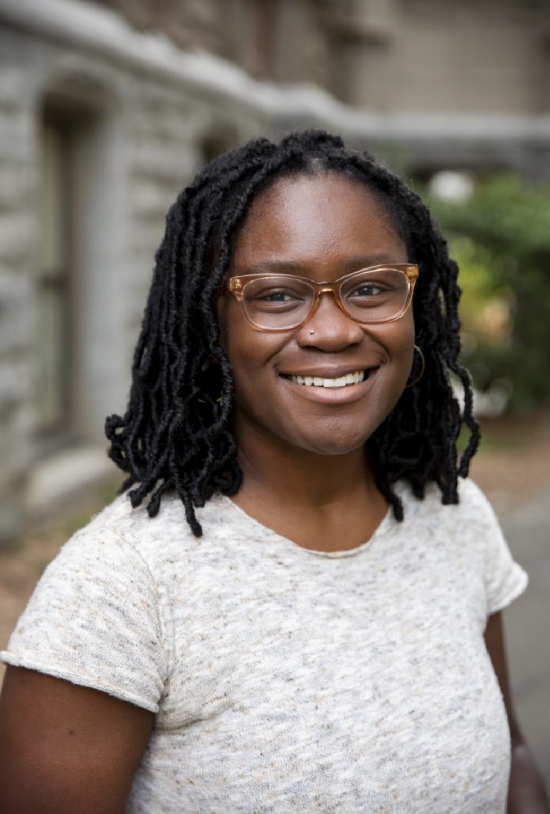Third-year I School Ph.D. student Seyi Olojo has been awarded a Fulbright scholarship to Germany, where she will have the opportunity to work with and study a Berlin-based environmental open-data collective on their data collection practices.
She will work with research mentors at the Weizenbaum Institute for the Networked Society (which is affiliated with the Technical University of Berlin) and pursue an ethnographic study of counter-data collection of air pollution in Berlin. She is especially interested in the sociopolitical context of their data collection as it exists in parallel to environmental reporting from the German government.
“At the core of this project is a community and how they create their own standards for environmental data collection and its eventual reporting,” Olojo explained. “I aim to specifically understand how cultural and racial differences create the grounds for varied knowledge practices surrounding communities collecting their own data, creating ethical frameworks specific to their local context, and then how they translate that into technical practices. I would like to see discourse around AI accountability and ethics that are highly specific to locality.”
Prior to applying for Fulbright, Olojo primarily focused on “the social life of data,” in particular, ways in which data collection and its application within algorithms harm marginalized communities. She recently co-authored a paper exploring the online harms related to data-driven recommendations for weight loss and diet ads targeted at individuals with disordered eating. Her current work explores participatory-based methods for combating online harms and promoting end-user data literacy. Olojo and her collaborators have worked with youth-based organizations such as the Sadie Nash Leadership Project to create workshops and educational materials for pre-teens and teens to understand such online harms.
Now, she hopes to extend this research into understanding how communities develop their own technologies, especially within its earliest stages such as data collection and labeling. Her fieldwork in Berlin aims to build off theoretical writing she has done around the idea of “counterdata,” a concept derived from scholarship in critical and political geography, which is due to come out in an anthology with other socio-technical researchers later this year.
Formerly, as a responsible AI/UX intern at Meta, she conducted research on the European Union’s Digital Services Act. The experience encouraged her to think about the globalized politics of data collection.
“Those [European and North American] histories converge in their legacies of colonialism and their afterlives are overrepresented within what we know as modern-day data science,” Olojo shared. She believes that Berlin, “a city constantly remaking itself,” will serve as an especially unique site to both observe this historical process beyond the United States and also understand how local and place-based knowledge offer important present-day interventions to emerging ethical dilemmas surrounding large-scale data collection, issues perpetuated by the increasing globalization of a data-driven world economy. Recent concerns in the data needed for Large Language Models (LLMs) such as Chat-GPT have been at the center of these concerns.
This opportunity, therefore, accumulates Olojo’s prior undergraduate research in climate vulnerability assessments and indices. Fulbright’s been a long-time goal of hers; she recalls beginning an application various times over the years.
“What pushed me into applying for a Fulbright [this time]…was that I had a hunch that the discourse we were seeing here in the U.S. wouldn’t be so different from the discourse we see in other Western hegemonies,” she said. “Germany is in the middle of its own environmental and energy revolution, so it’s a critical time to study how politically oppressed communities not only resist “official” statistics but create their own when in high-stakes settings…environmental justice in particular, has been a particular issue that I’ve cared about for a very long time now”.
While research remains Olojo’s key objective in Berlin, she is nevertheless excited to explore the city’s world-renowned art scene. This includes Afrocentric influences on some of Germany’s most iconic artistic movements such as Bauhaus.
Olojo also offered a few words of wisdom for those trying to realize seemingly unreachable dreams: “Don’t be afraid to constantly redesign the path you take to achieving a particular goal.”
“As a graduate student,” she continued, “I’ve spent a lot of time ideating and working towards various projects, but I’ve come to understand that they are all various articulations of a singular long-term interest. Whatever your interests are, those things that motivate you, there’s real meaning and coherency behind that even if the path towards realizing it doesn't seem super clear.”
“I find that the most meaningful projects usually originate from an idea or goal that, at one point in time, felt nearly impossible. Have faith that the work you are doing will get you back there.”










